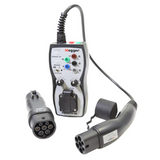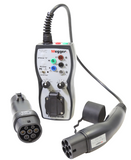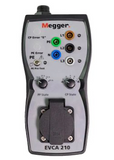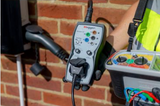Why shop local?
Local support
Local delivery service
Calibrated in our Dublin Lab
Warranty through us
Supports Irish Jobs
Megger EVCA210 - Electric Car Charger Point Adapter
Same day shipping on all orders placed before 11am, if in stock.
EVCA210
ELECTRIC VEHICLE CHARGE-POINT ADAPTOR
- Type 2 Charging Plug for charging points with panel mounted socket outlet or fixed cable with vehicle connector
- Type 1 Charging Plug for charging points with fixed cable and vehicle connector
- (Example Mitsubishi PHEV) – option for the EVCA210/standard on the EVCA21
- IP54 rated
- CAT II 300 V rated
- Comes with carrying case
- Complies with Low Voltage Directive LVD 2014/35
The EVCA210 Electric vehicle charge-point adaptor is a compact, easy-to-use adapter designed to perform all the functions required by the electrical contractor to fully test Mode 3 AC Electric Vehicle Charge-points. Specially designed to comply with UK, European, and other international wiring regulations and standards, the EVCA210 may be used on all single- and three-phase electric vehicle charge points with appropriate connectors.
The EVCA210 is designed to test the function and safety of a charging point. The adapters allow you to conduct tests using appropriate single or multifunction test instruments on EV charging points in accordance with IEC/EN 61851-1 and IEC/HD 60364-7-722. Charging points should be tested as part of the initial installation and repeated periodically.
The Megger EVCA210/EVCA210-UK test adaptors are designed to simulate the connection of an electrical vehicle to the charging point under test. Connection of the adapter enables the operator to trigger the charging process by selecting the appropriate Proximity Pilot (PP) and Control Pilot (CP) states. Test instruments can be connected using either the front mounted mains socket or the 4 mm connection ports L1, L2, L3, N, PE. Two additional CP signal terminals give the operator the ability to measure the CP signal using an oscilloscope.
In addition, the adapters have a manual PE Pre-Test feature that allows the user to test for dangerous voltages present on the PE, prior to any other testing of the charge point. If this test fails, testing must cease as potentially dangerous voltages may be present on the PE and faults must be investigated and rectified before continuing.












